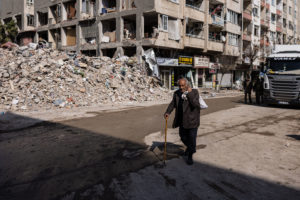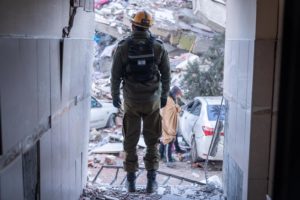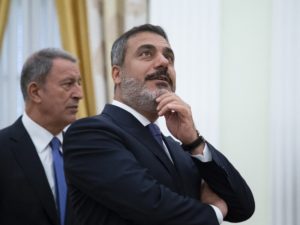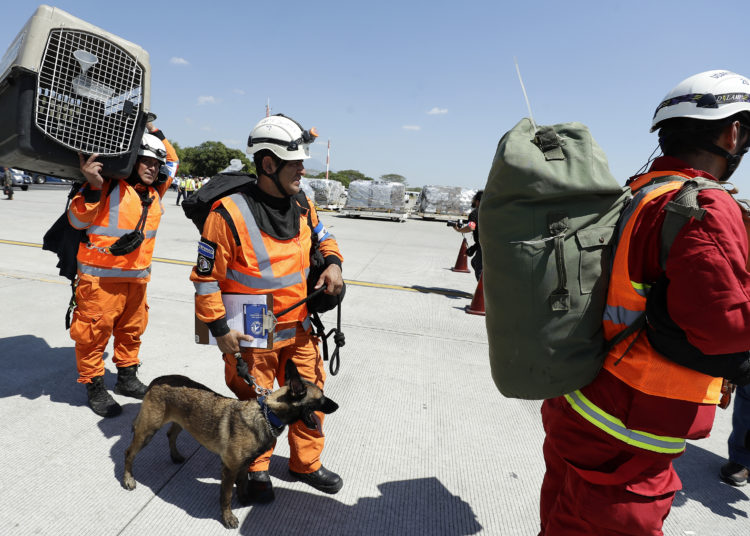Abdullah Bozkurt/Stockholm
Turkish intelligence agency MIT shadowed foreign aid workers who were deployed to contribute to rescue and relief efforts in the aftermath of devastating earthquakes in southern Turkey on Feb. 6, MIT’s propaganda point man has publicly admitted.
Ali Burak Darıcılı, a former intelligence officer who has been working as a publicist for the agency, said on February 22 that MIT vetted all aid workers sent to Turkey, ran background checks and took a closer look in particular at members of an Israeli delegation that was dispatched to Turkey.
The surveillance, which at times amounted to harassment and risked the safety of foreign workers, shows the paranoia in the leadership of the government of Turkish President Recep Tayyip Erdoğan, apparently more concerned about backlash from frustrated voters than the lives of tens of thousands of people who perished under the rubble.
Stating that MIT has regional and district offices in some of the 10 earthquake-hit provinces, Darıcılı revealed that intelligence agents were in the field tracking foreign aid workers round the clock. Responding to criticism on social media by pro-government trolls of alleged espionage by rescue teams, he said, “About the much-speculated Israeli delegation, do they [critics] think that they [foreign rescue workers] are not under control and just freely wandering around?”

Darıcılı asserted that MIT had maintained complete control of all foreign delegations in the earthquake zone. He claimed military intelligence and Mossad agents were embedded in the rescue teams deployed by Israel to Turkey but said they were mostly agents with technical expertise to help in search and rescue efforts using sophisticated technology.
He added that the MIT counterespionage department has been monitoring foreign rescue and aid workers and submitting reports to President Erdoğan
Several foreign rescue teams such as those from Israel and Spain had to leave Turkey earlier than planned over immediate security threats directed against them in the quake zone. German and Austrian teams suspended operations due to risks and resumed only after assurances by Turkish authorities.
According to the MIT publicist, the the state of emergency rushed through parliament by the Erdoğan government in the earthquake zone would also help MIT expand its operations in the area. The declaration of the state of emergency, which was unusual given the fact that the previous Turkish government did not feel the need to resort to such an action when earthquakes killed over 18,000 people in Turkey in 1999, will help MIT thwart the work of foreign missionaries and aid groups in the quake zone.
“Some associations and NGOs may disseminate propaganda, and some may be involved in espionage. This [state of emergency] allows authorities to implement administrative measures to prevent this,” said Darıcılı.
It is clear that the Erdoğan government would resort to emergency measures to stifle dissent, clamp down on criticism and restrict rights and freedoms on the pretext of post-quake relief activities. This is especially useful for Erdoğan ahead of critical elections that are scheduled for May and that may seal the fate of his political career.
Darıcılı was recruited by MIT in 2001 and had various assignments in Turkey and overseas. In his resume he never mentions his background at the agency but simply states that he had worked for the intelligence department of the Prime Ministry since MIT was under its jurisdiction until 2018, when the Prime Ministry was abolished and Erdoğan assumed imperial-style presidential powers.

Officially he is employed as an academic at Bursa Technical University but spends much of his time commenting on MIT activities on propagandist TV networks.
In May 2022 Darıcılı revealed that MIT had forcibly returned to Turkey Erdoğan government critics linked to the Gülen movement from some African and Central Asian countries by bribing local officials. When asked how MIT had been able to accomplish that in those countries but had failed to do so in European countries and the United States, he explained that locals were being bribed to help them as collaborators in such “failed states” as those in Africa and Central Asia while carrying out the abduction of Gülenists.
Darıcılı added that it’s not possible to do the same in countries with strong democracies and the rule of law such as Germany since “If you’re exposed carrying out such covert activities, you’ll have a big problem under international law” because it amounts to interfering with the internal affairs of the relevant country.

The Gülen movement, inspired by Turkish Islamic scholar Fethullah Gülen, has been critical of Erdoğan’s rule on a range of issues including pervasive corruption in the government and Turkey’s aiding and abetting of armed jihadist groups. The movement has been in Erdoğan’s crosshairs since 2010.
Erdoğan was furious at Gülen in the aftermath of the tragic Mavi Marmara flotilla incident in 2010, which resulted in the death of eight Turks and one dual Turkish-US citizen. In an interview with The Wall Street Journal on June 4, 2010, Gülen criticized the Erdoğan government for allowing al-Qaeda-linked Turkish charity group the Foundation for Human Rights and Freedoms and Humanitarian Relief (IHH) to organize the flotilla.
Gülen went on to criticize the group for failing to obtain Israel’s consent before setting out on their aid mission. “Organizers’ failure to seek accord with Israel before attempting to deliver aid is a sign of defying authority, and will not lead to fruitful matters,” he was quoted as saying. Gülen’s take on of the IHH, a pro-Erdoğan group that works closely with MIT, was not well received by the Erdoğan government.
In 2011 Erdoğan, prime minister at the time, told a group of Turkish ambassadors at a closed meeting in Ankara that “I can declare them [Gülen movement sympathizers] terrorists with a prosecutor and three policemen and finish them off,” in an apparent hint of framing the group with false accusations and abuse of the criminal justice system in Turkey.

Erdoğan publicly branded the group as terrorists in the aftermath of the corruption investigations of December 17-25, 2013, which implicated then-prime minister Erdoğan, his family members and his inner circle. Dismissing the investigations as a Gülenist coup and conspiracy against his government, Erdoğan designated the movement as a terrorist organization and began to target its members. He intensified the crackdown on the movement following an abortive putsch in 2016, which later turned out to be a false flag orchestrated by MIT.
MIT, run by Erdoğan’s long-time confidant Hakan Fidan, has much at stake in the upcoming elections as well. It has been transformed into the president’s private detective agency that is busy digging up dirt on his political opponents, running false flag operations such as the failed 2016 coup to empower him and crack down on dissident groups. MIT also runs widespread influence ops with assets and operatives planted in media outlets to shape the narrative in Turkey, in particular with schemes to fuel xenophobia and anti-Western hysteria among the Turkish populace.
Darıcılı, who describes himself an academic, has been showing up at various media outlets in Turkey to spread propaganda on behalf of the spy agency, often telling stories about how MIT successfully exposed foreign intelligence activities and unmasked their agents, especially with respect to Greece and Israel, the two countries Erdoğan loves to bash to ramp up nationalistic and religious zealotry in Turkey.












